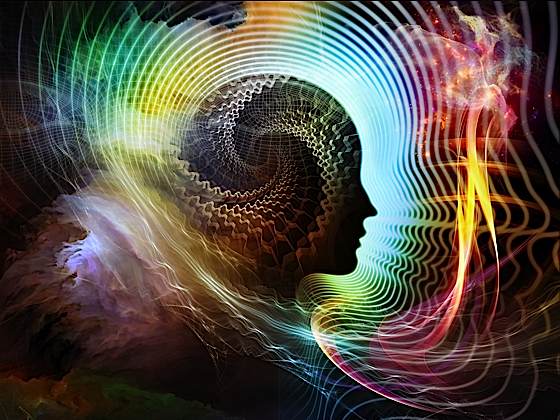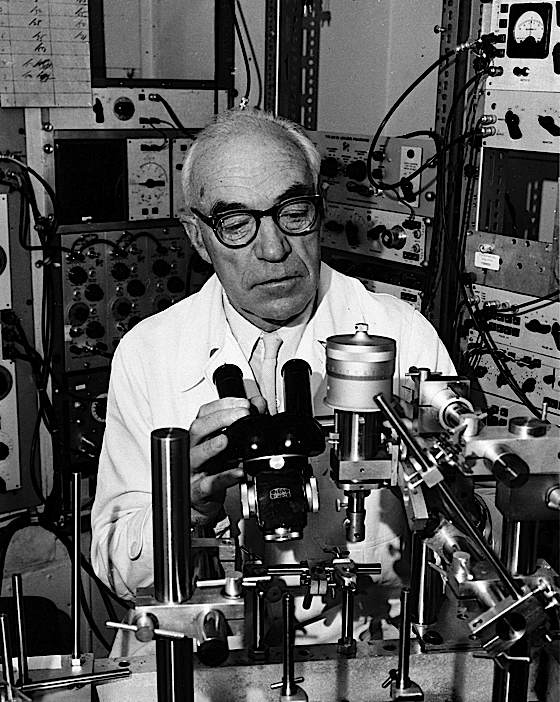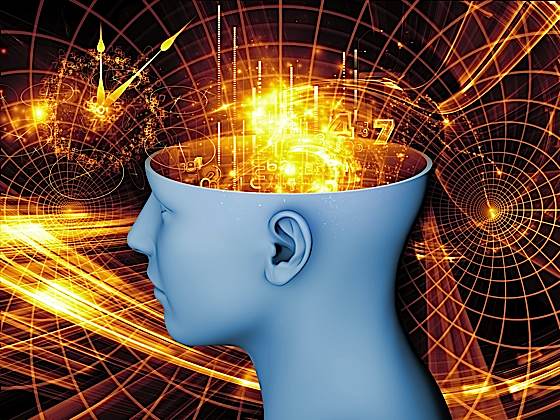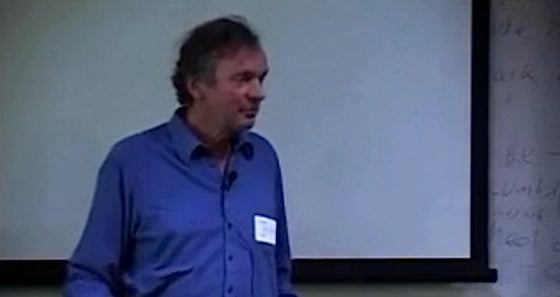Olivia Glad
Honorable
We don’t know what consciousness is, or what it does,” said Rupert Sheldrake, Ph.D. in his lecture The Mind is Not the Brain “There’s no known, obvious reason, why we should be conscious at all, or exactly how the mind works.” His conclusion, based on significant research, was: “…The mind is field-like. That it’s not constrained to the inside of the head.” (See embedded video for this full lecture.)
There is growing scientific acceptance for Mr. Sheldrake’s thesis, some of which he outlines in his lecture. In fact, consciousness studies is one of the most exciting frontier areas of science today.

A growing group of scientists in consciousness studies theorize the mind as an energy-like field surrounding and separate from the body.
Nobel Prize winning neuroscience Professor Eccles supports the theory that the mind is a separate entity and cannot be “reduced down to the brain cell processes,” according to the Horizon Research Foundation.
An article on the Foundation’s site, asserts “we will never be able to account for the formation of consciousness through the electrical and chemical processes of the brain.” For skeptics, it’s important to realize that all articles on the Research Foundation’s website are reviewed or prepared by scientists directly involved in research.

Photo of Professor John Eccles, Nobel Prize-Winning Scientist. Image courtesy of John Curtin School of Medical Research, Australian National University. Wikimedia Commons.
Professors Karl Popper and John Eccles demonstrated that research indicates a conscious event happens before the relevant brain event, in The Self and Its Brain.
These eminent scientists theorized not just mental and conscious events as separate from the brain, but a self-conscious mind distinct from both.
After Death, Consciousness Continues?
In a well-researched article, Steps Towards Solving the Mystery of Consciousness, the concept of consciousness surviving apparent brain death is highlighted. “Consciousness appears to be present in 10-20 percent of those who are in cardiac arrest.” The author explained, “brain cells need to communicate using electrical pulses… How is it then that we have a clinical scenario in which there is severe brain dysfunction, the worst possible type, with an absence of electrical activity in the brain, but somehow thought processes, with reasoning, memory formation and consciousness continue and are even heightened?

Well documented near-death studies, together with research conducted on patients who undergo cardiac arrest, lead to a growing acceptance that the mind continues after the brain function ends.
From a Buddhist perspective, the duality of mind separate from brain has been accepted since the beginning, and, in some ways, seems a critical support for fundamental Buddhist beliefs in rebirth and karma.
“There are many explanations of what the mind is and of the different categories of mind,” said His Holiness the Dalai Lama in a speech in England in 2008. “For example, there’s a difference made in Buddhism between primary minds and mental factors.” His Holiness explains the two types: “One is brought forth by sensory perception as its immediately preceding condition and the other lacks sensory perception as its immediately preceding condition.”

His Holiness, the Dalai Lama.
Until recently, these beliefs have been treated as “faith” fundamentals, supported by authority of the Buddha, and eloquently championed in Dharma debate. Increasingly, there is more and more support amongst scientists specializing in consciousness studies. Promising research may allow us to also anchor our concept of mind, in convincing proofs.
Dr. Alexander Berzin, in his lecture The Conventional Nature of Mind, described it this way: “You can describe experiencing from the point of view of physically what’s happening – there’s the brain and the chemicals and electric stuff – or you can just describe it in terms of subjective experience of it. So we’re talking about the subjective experience of it when we talk about mind.” He went on to explain that the Four Noble Truths are experienced by the mind.
Where is Mind?
Dr. Sheldrake, in his lecture The Mind is Not the Brain, first touches on the important discussion of “just where is the mind?” He describes mind as field-like, similar to the gravitational field of the world, “which stretches out far beyond the earth.”

Mind, thought by many theorists to be separate from the brain, is often described as a field, similar to a gravity field.
These fields are within and around the systems they organize, he said, referring to examples such as magnets and gravity which expand beyond. “And I think the same is true of our minds.”
“If the mind is just the brain, which is the normal assumption within academic and medical worlds,” he continued, “then mental activity is nothing but brain activity,” a notion he then elaborately deconstructs as erroneous. He uses an elaborate example of the mechanism of vision, or seeing, describing first the physiological and neurological mechanism, then the two clear options that explain how we actually “see”. Either the images are projected inside our skull or brain in a form of “virtual reality” or they are exactly where appear, because the mind is able to project or see beyond the brain exactly where it is.

Doctor Sheldrake, a leading scientist researching mind.
He illustrates this by asking the question, “Can you influence something just by looking at it?” He cites studies that indicate that over 90% of people can “feel” when people are looking at them, even when they have their back turned to that person. In scientific studies, there’s overwhelming evidence this is a genuine phenomenon. He illustrates with training examples from the security industry, where it is standard training to security personnel to never look directly a suspect’s back.
The Dalai Lama expounded on the nature of mind in a 2014 speech in Cambridge: “In general, the mind can be defined as an entity that has the nature of mere experience, that is, “clarity and knowing.” It is the knowing nature, or agency, that is called mind, and this is non-material.”
“Buddhist literature, both sutra and tantra, contains extensive discussions on mind and its nature. Tantra, in particular, discusses the various levels of subtlety of mind and consciousness… with references to the various subtleties of the levels of consciousness and their relationship to such physiological states as the vital energy centers within the body, the energy channels, the energies that flow within these and so on.”
Mind Field Theory
The concept of energy channels (often called chakras) and energy body—as described by his Holiness—has been well accepted for centuries in most parts of Asia. In Buddhist visualization, mind and energy are naturally visualized as separate from body in some practices. This aligns with newly emerging science in the field of consciousness studies.
Aligning with this ancient thought, Dr. Sheldrake—a pioneer in consciousness field theory—explains the mind as a field, similar to a gravity field. He supports this with extensive blind research studies, and illustrates with examples such as bird flocks and fish schools, who seem to almost telepathically communicate. He also delves into Quantum particle theories in support of his theory.

Symbolizing the cycle of life, the bud, blossom of a Lotus, and wilted blossom, then the new bud of new life—mind is thought of as transcending physical existence.
Why is this important?
The brain, in relative dualistic terms, is a physical, impermanent implement. The mind is not impermanent. This is plausibly theorized by research from Professors Popper and Eccles who describe “a Self-Conscious Mind” independent of the brain, that functions even after cardiac arrest.
Self conscious mind, surviving cardiac arrest, is reassuring to those of us who believe that mind survives death. Although rebirth is supported by various other research and near-death studies, the notion of conscious mind surviving physical death adds a new dimension to death meditation and daily practice.
There is growing scientific acceptance for Mr. Sheldrake’s thesis, some of which he outlines in his lecture. In fact, consciousness studies is one of the most exciting frontier areas of science today.

A growing group of scientists in consciousness studies theorize the mind as an energy-like field surrounding and separate from the body.
Nobel Prize winning neuroscience Professor Eccles supports the theory that the mind is a separate entity and cannot be “reduced down to the brain cell processes,” according to the Horizon Research Foundation.
An article on the Foundation’s site, asserts “we will never be able to account for the formation of consciousness through the electrical and chemical processes of the brain.” For skeptics, it’s important to realize that all articles on the Research Foundation’s website are reviewed or prepared by scientists directly involved in research.

Photo of Professor John Eccles, Nobel Prize-Winning Scientist. Image courtesy of John Curtin School of Medical Research, Australian National University. Wikimedia Commons.
Professors Karl Popper and John Eccles demonstrated that research indicates a conscious event happens before the relevant brain event, in The Self and Its Brain.
These eminent scientists theorized not just mental and conscious events as separate from the brain, but a self-conscious mind distinct from both.
After Death, Consciousness Continues?
In a well-researched article, Steps Towards Solving the Mystery of Consciousness, the concept of consciousness surviving apparent brain death is highlighted. “Consciousness appears to be present in 10-20 percent of those who are in cardiac arrest.” The author explained, “brain cells need to communicate using electrical pulses… How is it then that we have a clinical scenario in which there is severe brain dysfunction, the worst possible type, with an absence of electrical activity in the brain, but somehow thought processes, with reasoning, memory formation and consciousness continue and are even heightened?

Well documented near-death studies, together with research conducted on patients who undergo cardiac arrest, lead to a growing acceptance that the mind continues after the brain function ends.
From a Buddhist perspective, the duality of mind separate from brain has been accepted since the beginning, and, in some ways, seems a critical support for fundamental Buddhist beliefs in rebirth and karma.
“There are many explanations of what the mind is and of the different categories of mind,” said His Holiness the Dalai Lama in a speech in England in 2008. “For example, there’s a difference made in Buddhism between primary minds and mental factors.” His Holiness explains the two types: “One is brought forth by sensory perception as its immediately preceding condition and the other lacks sensory perception as its immediately preceding condition.”

His Holiness, the Dalai Lama.
Until recently, these beliefs have been treated as “faith” fundamentals, supported by authority of the Buddha, and eloquently championed in Dharma debate. Increasingly, there is more and more support amongst scientists specializing in consciousness studies. Promising research may allow us to also anchor our concept of mind, in convincing proofs.
Dr. Alexander Berzin, in his lecture The Conventional Nature of Mind, described it this way: “You can describe experiencing from the point of view of physically what’s happening – there’s the brain and the chemicals and electric stuff – or you can just describe it in terms of subjective experience of it. So we’re talking about the subjective experience of it when we talk about mind.” He went on to explain that the Four Noble Truths are experienced by the mind.
Where is Mind?
Dr. Sheldrake, in his lecture The Mind is Not the Brain, first touches on the important discussion of “just where is the mind?” He describes mind as field-like, similar to the gravitational field of the world, “which stretches out far beyond the earth.”

Mind, thought by many theorists to be separate from the brain, is often described as a field, similar to a gravity field.
These fields are within and around the systems they organize, he said, referring to examples such as magnets and gravity which expand beyond. “And I think the same is true of our minds.”
“If the mind is just the brain, which is the normal assumption within academic and medical worlds,” he continued, “then mental activity is nothing but brain activity,” a notion he then elaborately deconstructs as erroneous. He uses an elaborate example of the mechanism of vision, or seeing, describing first the physiological and neurological mechanism, then the two clear options that explain how we actually “see”. Either the images are projected inside our skull or brain in a form of “virtual reality” or they are exactly where appear, because the mind is able to project or see beyond the brain exactly where it is.

Doctor Sheldrake, a leading scientist researching mind.
He illustrates this by asking the question, “Can you influence something just by looking at it?” He cites studies that indicate that over 90% of people can “feel” when people are looking at them, even when they have their back turned to that person. In scientific studies, there’s overwhelming evidence this is a genuine phenomenon. He illustrates with training examples from the security industry, where it is standard training to security personnel to never look directly a suspect’s back.
The Dalai Lama expounded on the nature of mind in a 2014 speech in Cambridge: “In general, the mind can be defined as an entity that has the nature of mere experience, that is, “clarity and knowing.” It is the knowing nature, or agency, that is called mind, and this is non-material.”
“Buddhist literature, both sutra and tantra, contains extensive discussions on mind and its nature. Tantra, in particular, discusses the various levels of subtlety of mind and consciousness… with references to the various subtleties of the levels of consciousness and their relationship to such physiological states as the vital energy centers within the body, the energy channels, the energies that flow within these and so on.”
Mind Field Theory
The concept of energy channels (often called chakras) and energy body—as described by his Holiness—has been well accepted for centuries in most parts of Asia. In Buddhist visualization, mind and energy are naturally visualized as separate from body in some practices. This aligns with newly emerging science in the field of consciousness studies.
Aligning with this ancient thought, Dr. Sheldrake—a pioneer in consciousness field theory—explains the mind as a field, similar to a gravity field. He supports this with extensive blind research studies, and illustrates with examples such as bird flocks and fish schools, who seem to almost telepathically communicate. He also delves into Quantum particle theories in support of his theory.

Symbolizing the cycle of life, the bud, blossom of a Lotus, and wilted blossom, then the new bud of new life—mind is thought of as transcending physical existence.
Why is this important?
The brain, in relative dualistic terms, is a physical, impermanent implement. The mind is not impermanent. This is plausibly theorized by research from Professors Popper and Eccles who describe “a Self-Conscious Mind” independent of the brain, that functions even after cardiac arrest.
Self conscious mind, surviving cardiac arrest, is reassuring to those of us who believe that mind survives death. Although rebirth is supported by various other research and near-death studies, the notion of conscious mind surviving physical death adds a new dimension to death meditation and daily practice.
